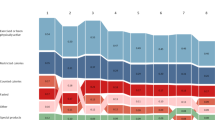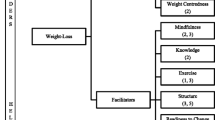Abstract
Purpose
To characterise individuals who reported present and past weight loss behaviours on psycho-behavioural factors known to influence body weight, e.g. overeating, dietary restriction.
Methods
An online questionnaire was distributed to a university community. Questions pertaining to present weight loss, previous weight loss, eating behaviour tendencies, perceived stress and sleep quality were answered by 3,069 individuals. Body weight and height were self-reported.
Results
Present and past weight loss behaviours were prevalent in the sample, with 33.3 % of the participants who reported trying to lose weight, 33.1 % who reported having previously lost weight (>10 lbs), and 18.8 % who reported repeated weight loss behaviour (i.e. present and past weight loss behaviours). Trying to lose weight and previous weight loss were both independently associated with increased risk for psycho-behavioural characteristics known to be associated with obesity, e.g. overeating tendencies, perceived stress, short sleep duration. This risk was particularly elevated among the underweight/normal-weight individuals who reported repeated weight loss behaviours. Indeed, adjusted odds ratios for reporting restrictive and overeating tendencies, perceived stress and short sleep for these individuals were significantly higher compared to their underweight/normal-weight peers who did not report repeated weight loss behaviours (adjusted odds ratios 4.7, 2.7, 1.8, and 1.8, respectively, p < 0.01 to <0.0001).
Conclusions
Normal-weight individuals reporting weight loss behaviours are characterised by a psycho-behaviour profile which may further increase their risk of weight gain.


Similar content being viewed by others
References
Yaemsiri S, Slining MM, Agarwal SK (2011) Perceived weight status, overweight diagnosis, and weight control among US adults: the NHANES 2003-2008 Study. Int J Obes (Lond) 35(8):1063–1070
O’Brien K, Venn BJ, Perry T, Green TJ, Aitken W, Bradshaw A et al (2007) Reasons for wanting to lose weight: different strokes for different folks. Eat Behav 8(1):132–135
Hesse-Biber S, Leavy P, Quinn CE, Zoino J (2006) The mass marketing of disordered eating and Eating Disorders: the social psychology of women, thinness and culture. Women Stud Int Forum 29:208–224
Karazsia BT, Crowther JH (2008) Psychological and behavioral correlates of the SATAQ-3 with males. Body Imag 5(1):109–115
Goldstein DJ (1992) Beneficial health effects of modest weight loss. Int J Obes Relat Metab Disord 16(6):397–415
Chaput JP, Drapeau V, Hetherington M, Lemieux S, Provencher V, Tremblay A (2005) Psychobiological impact of a progressive weight loss program in obese men. Physiol Behav 86(1–2):224–232
Doucet E, Imbeault P, St-Pierre S, Almeras N, Mauriege P, Richard D et al (2000) Appetite after weight loss by energy restriction and a low-fat diet-exercise follow-up. Int J Obes Relat Metab Disord 24(7):906–914
Tomiyama AJ, Mann T, Vinas D, Hunger JM, Dejager J, Taylor SE (2010) Low calorie dieting increases cortisol. Psychosom Med 72(4):357–364
French SA, Jeffery RW (1994) Consequences of dieting to lose weight: effects on physical and mental health. Health Psychol 13(3):195–212
Polivy J (1996) Psychological consequences of food restriction. J Am Diet Assoc 96(6):589–592 (quiz 93–94)
Hart KE, Chiovari P (1998) Inhibition of eating behavior: negative cognitive effects of dieting. J Clin Psychol 54(4):427–430
Biener L, Heaton A (1995) Women dieters of normal weight: their motives, goals, and risks. Am J Public Health 85(5):714–717
Neumark-Sztainer D, Wall M, Story M, Standish AR (2012) Dieting and unhealthy weight control behaviors during adolescence: associations with 10-year changes in body mass index. J Adolesc Health 50(1):80–86
Savage JS, Hoffman L, Birch LL (2009) Dieting, restraint, and disinhibition predict women’s weight change over 6 y. Am J Clin Nutr 90(1):33–40
Drapeau V, Provencher V, Lemieux S, Despres JP, Bouchard C, Tremblay A (2003) Do 6-y changes in eating behaviors predict changes in body weight? Results from the Quebec Family Study. Int J Obes Relat Metab Disord 27(7):808–814
Kruger J, Galuska DA, Serdula MK, Jones DA (2004) Attempting to lose weight: specific practices among US adults. Am J Prev Med 26(5):402–406
Bish CL, Blanck HM, Serdula MK, Marcus M, Kohl HW 3rd, Khan LK (2005) Diet and physical activity behaviors among Americans trying to lose weight: 2000 Behavioral Risk Factor Surveillance System. Obes Res 13(3):596–607
Martinelli V, Colombo O, Nichini C, Repossi I, Vinai P, Tagliabue A (2011) High frequency of psychopathology in subjects wishing to lose weight: an observational study in Italian subjects. Public Health Nutr 14(2):373–376
Wilson GT (1993) Relation of dieting and voluntary weight loss to psychological functioning and binge eating. Ann Intern Med 119(7):727–730
Johnson F, Pratt M, Wardle J (2012) Dietary restraint and self-regulation in eating behavior. Int J Obes (Lond) 36(5):665–674
Pérusse-Lachance E, Bégin C, Provencher V, Drapeau V (2011) Losing weight: who is currently trying? Can J Diabetes 35(2):201
Québec Santé (1998) Questionnaire sur les habitudes de vie et la santé Annexe 3—Questionnaire autoadministré (QAA). Centre d’enquêtes sociales, Santé Québec
Statistiques Canada. Enquête sur la santé dans les collectivités Canadiennes, cycle 2.2, Nutrition. Statistiques Canada; 2004
Stunkard AJ, Messick S (1985) The three-factor eating questionnaire to measure dietary restraint, disinhibition and hunger. J Psychosom Res 29(1):71–83
Chaput JP, Leblanc C, Perusse L, Despres JP, Bouchard C, Tremblay A (2009) Risk factors for adult overweight and obesity in the Quebec Family Study: have we been barking up the wrong tree? Obesity (Silver Spring) 17(10):1964–1970
Andreyeva T, Long MW, Henderson KE, Grode GM (2010) Trying to lose weight: diet strategies among Americans with overweight or obesity in 1996 and 2003. J Am Diet Assoc 110(4):535–542
Serdula MK, Mokdad AH, Williamson DF, Galuska DA, Mendlein JM, Heath GW (1999) Prevalence of attempting weight loss and strategies for controlling weight. JAMA 282(14):1353–1358
Crawford D, Campbell K (1999) Lay definitions of ideal weight and overweight. Int J Obes Relat Metab Disord 23(7):738–745
Baghurst T, Hollander DB, Nardella B, Haff GG (2006) Change in sociocultural ideal male physique: an examination of past and present action figures. Body Image 3(1):87–91
Grogan S (2008) Body image: Understanding Body Dissatisfaction in Men, Women and Children. Psychology Press, New york
Thomson CA, Morrow KL, Flatt SW, Wertheim BC, Perfect MM, Ravia JJ et al (2012) Relationship between sleep quality and quantity and weight loss in women participating in a weight-loss intervention trial. Obesity (Silver Spring) 20(7):1419–1425
Chaput JP, Tremblay A (2012) Sleeping habits predict the magnitude of fat loss in adults exposed to moderate caloric restriction. Obes Facts 5(4):561–566
Bryant EJ, King NA, Blundell JE (2008) Disinhibition: its effects on appetite and weight regulation. Obes Rev 9(5):409–419
Dalle Grave R, Calugi S, Corica F, Di Domizio S, Marchesini G (2009) Psychological variables associated with weight loss in obese patients seeking treatment at medical centers. J Am Diet Assoc 109(12):2010–2016
Wing RR, Phelan S (2005) Long-term weight loss maintenance. Am J Clin Nutr 82(1 Suppl):222S–225S
McGuire MT, Jeffery RW, French SA, Hannan PJ (2001) The relationship between restraint and weight and weight-related behaviors among individuals in a community weight gain prevention trial. Int J Obes Relat Metab Disord 25(4):574–580
Bryant EJ, Caudwell P, Hopkins ME, King NA, Blundell JE (2012) Psycho-markers of weight loss. The roles of TFEQ disinhibition and restraint in exercise-induced weight management. Appetite 58(1):234–241
Klesges RC, Isbell TR, Klesges LM (1992) Relationship between dietary restraint, energy intake, physical activity, and body weight: a prospective analysis. J Abnorm Psychol 101(4):668–674
Bryant EJ, Kiezebrink K, King NA, Blundell JE (2010) Interaction between disinhibition and restraint: implications for body weight and eating disturbance. Eat Weight Disord 15(1–2):e43–e51
Gallant AR, Tremblay A, Perusse L, Despres JP, Bouchard C, Drapeau V (2012) Past dieting is related to rigid control and disinhibition in adolescents from the Quebec Family Study. Br J Nutr 108(11):1–4
Gallant AR, Tremblay A, Perusse L, Bouchard C, Despres JP, Drapeau V (2010) The three-factor eating questionnaire and BMI in adolescents: results from the Quebec Family Study. Br J Nutr 7:1–6
Yeomans MR, Coughlan E (2009) Mood-induced eating. Interactive effects of restraint and tendency to overeat. Appetite 52(2):290–298
Westenhoefer J, Broeckmann P, Munch AK, Pudel V (1994) Cognitive control of eating behaviour and the disinhibition effect. Appetite 23(1):27–41
Hays NP, Bathalon GP, McCrory MA, Roubenoff R, Lipman R, Roberts SB (2002) Eating behavior correlates of adult weight gain and obesity in healthy women aged 55-65 y. Am J Clin Nutr 75(3):476–483
Williamson DA, Lawson OJ, Brooks ER, Wozniak PJ, Ryan DH, Bray GA et al (1995) Association of body mass with dietary restraint and disinhibition. Appetite 25(1):31–41
Westenhoefer J (1991) Dietary restraint and disinhibition: is restraint a homogeneous construct? Appetite 16(1):45–55
McLean JA, Barr SI (2003) Cognitive dietary restraint is associated with eating behaviors, lifestyle practices, personality characteristics and menstrual irregularity in college women. Appetite 40(2):185–192
Anderson DA, Shapiro JR, Lundgren JD, Spataro LE, Frye CA (2002) Self-reported dietary restraint is associated with elevated levels of salivary cortisol. Appetite 38(1):13–17
Bedford JL, Prior JC, Barr SI (2010) A prospective exploration of cognitive dietary restraint, subclinical ovulatory disturbances, cortisol, and change in bone density over two years in healthy young women. J Clin Endocrinol Metab 95(7):3291–3299
Hudd SS, Dumlao J, Erdmann-Sager D, Murray D, Phan E, Soukas N (2000) Stress at college: effects on health habits, health status and self-esteem. Coll Stud J 34:217–228
Torres SJ, Nowson CA (2007) Relationship between stress, eating behavior, and obesity. Nutrition 23(11–12):887–894
Wardle J, Steptoe A, Oliver G, Lipsey Z (2000) Stress, dietary restraint and food intake. J Psychosom Res 48(2):195–202
Hays NP, Roberts SB (2008) Aspects of eating behaviors “disinhibition” and “restraint” are related to weight gain and BMI in women. Obesity (Silver Spring) 16(1):52–58
Neumark-Sztainer D, Wall M, Guo J, Story M, Haines J, Eisenberg M (2006) Obesity, disordered eating, and eating disorders in a longitudinal study of adolescents: how do dieters fare 5 years later? J Am Diet Assoc 106(4):559–568
Acknowledgments
This project was supported by the Ministère de l’éducation, du loisir et du sport du Québec and the Comité relatif au cadre de référence pour une saine alimentation et un mode de vie physiquement actif de l’Université Laval. ARG and EPL are supported by the Heart and Lung Research Institute of Québec (CRIUCPQ). V.P. is a research scholar from the Fonds de recherche du Quebec en santé.
Conflict of interest
On behalf of all authors, the corresponding author states that there is no conflict of interest.
Author information
Authors and Affiliations
Corresponding author
Rights and permissions
About this article
Cite this article
Gallant, A.R., Pérusse-Lachance, É., Provencher, V. et al. Characteristics of individuals who report present and past weight loss behaviours: results from a Canadian university community. Eat Weight Disord 18, 395–401 (2013). https://doi.org/10.1007/s40519-013-0057-4
Received:
Accepted:
Published:
Issue Date:
DOI: https://doi.org/10.1007/s40519-013-0057-4




